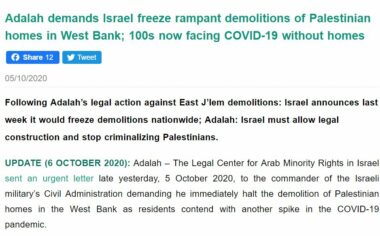According to the United Nations Office for the Coordination of Humanitarian Affairs (OCHA), the period from March to September 2020 saw the demolition or confiscation of 370 Palestinian-owned structures in the West Bank. This marked the highest average monthly demolition rate in four years.
Adalah Attorney Suhad Bishara noted in the urgent letter that Israeli demolitions during this period left 305 people homeless.
Israel’s intolerable policy is a direct violation of international law. Jamie McGoldrick, deputy special coordinator for the Middle East peace process and UN resident coordinator and humanitarian coordinator for the Occupied Palestinian Territory also warned that “the demolition of essential structures during the time of the COVID-19 pandemic is particularly worrying as it further compounds the overall situation in the West Bank.”
In addition to homes, Israeli demolitions also targeted Palestinian properties including water, hygiene and sanitation assets, and structures used for agriculture, undermining the access of many to livelihoods and services. Moreover, 50 of the structures had been given to Palestinians as humanitarian aid, and their destruction hit the most vulnerable of all, undermining essential emergency operations.
The COVID-19 pandemic and the additional restrictions placed on Palestinian residents of the West Bank also makes it significantly more difficult – both practically and economically – for those whose homes have been demolished to secure legal defense.
Adalah Attorney Suhad Bishara wrote in the urgent letter:
Following Adalah’s legal action against East J’lem home demolitions: Israel freezes demolitions nationwide
In response to legal action taken by Adalah, Israeli authorities clarified on 1 October 2020 that the state is freezing home demolitions across the country, as was the case during the first wave of the COVID-19 crisis.
On 17 August 17 2020, Adalah Attorney Suhad Bishara, in coordination with the Civic Coalition for Palestinian Rights in Jerusalem, sent a letter to Israeli Attorney General Avichai Mandelblit and other state officials demanding they bring an immediate halt to Israel’s accelerated policy of home demolitions in Palestinian neighborhoods of occupied East Jerusalem.
Israel had amped up its demolitions of Palestinian homes in the city after COVID-19 morbidity rates dropped during the summer months.
According to a report by the United Nations Office for the Coordination of Humanitarian Affairs (OCHA), Israel demolished 31 buildings in East Jerusalem in July and August, leaving about 96 people homeless.
As of August, and since the beginning of 2020, Israel has demolished 112 Palestinian buildings and 261 people were left homeless as a result, including countless children. An additional 467 Palestinian residents were harmed as a result of partial demolitions of structures by Israeli authorities.
In addition, Israeli authorities issued extensive warnings of threatened home demolitions to Bedouin residents of the Naqab (Negev) region during the summer and initiated legal proceedings seeking demolitions of Bedouin-built structures.
The Israeli Justice Ministry responded on 1 October 2020:
“After re-examining things – and given the restrictions recently imposed by the government following the further spread of COVID-19 –it has been decided at this stage, to adjust the enforcement policy of planning and construction offenses to align with the state of emergency, similar to the policy decided upon in March 2020.”
The AG’s office further added that the new policy would be examined later, in accordance with the government’s evolving COVID-19 emergency policies.
Israeli authorities’ released details regarding the new policy include:
- The issuance of administrative demolition orders will be reduced and orders will be issued only in relation to new “illegal construction”, particularly that which has taken advantage of the state of emergency;
- As a general rule, in an emergency, demolition orders for residential buildings will not be enforced;
- Warning notices regarding demolition orders will also be kept to a minimum.
Israeli authorities also noted that “due to the state of emergency, the National Unit for the Enforcement of Planning and Construction Law will reduce its friction with the population” but they also made clear that enforcement in relation to new construction-related offenses would continue.
Attorney Suhad Bishara, director of Adalah’s Land and Planning Rights Unit, responded:


